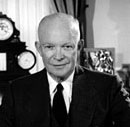|
3. Many heart attack victims were saved, thanks to a heart drug developed at the U

| Former President Dwight Eisenhower was one of the first, and most famous, heart attack victims to benefit from a heart drug developed at the University of Minnesota. Physiologist Marvin Bacaner developed bretylium tosylate in the 1960s, as a treatment for preventing and treating irregular heart rhythms.
(Photo courtesy of the National Park Service and the Dwight D. Eisenhower Library)
|
University of Minnesota physiologist Marvin Bacaner developed the drug, bretylium tosylate, in the 1960s. It has been used to save countless heart attack victims over the past 30 years.
One of the most famous patients was former President Dwight Eisenhower. In May, 1967, Bacaner got a phone call from a physician at Walter Reed Hospital in Washington D.C. The doctor had heard about a new anti-fibrillation drug Bacaner developed, and wanted to try it on Eisenhower, who had suffered a severe heart attack. Bacaner sent a supply of bretylium tosylate to Washington D.C., and it was credited with saving Eisenhower's life.
Bretylium was patented in 1978, and has become a widely prescribed drug for preventing and treating heart arrhythmias. The university earned more than $10 million in royalties from sales of the drug. Bretylium also was featured in the movie E.T. - it was the drug that saved the alien's life.
Bacaner, 76, is a professor emeritus in the medical school's department of physiology. He is still active in research. He is currently working on an oral form of bretylium that could be carried by people who have heart disease, and taken if they experience chest pains.
In the fall of 1999, the Marvin and Hadassa Bacaner Endowed Chair in Cardiovascular Physiology was established at the university to fund ongoing research into treatments for heart disease. Bacaner and the university each contributed half of the $1 million endowment, which will be used to recruit a researcher in the promising new field of molecular cardiology. Bacaner says research in this area could lead one day to gene therapy for heart disease.
|